Sticking to the service maintenance schedule recommended by your car manufacturer is an essential part of making sure that your car stays in good condition. This most important maintenance process is known as the car tune-up and involves several services which we’ll be exploring below.
Depending on the complexity of the maintenance process, car tune up cost can range from $140 to $900.
The specific car tune up costs and timing will depend on the requirements of your particular car model and how long you’ve had it for. Otherwise, standard tune up prices for SUVs, trucks and regular cars range from $50 to $250, whereas a more multifaceted service can set you back anything from $400 to $1000.
The prices include the cost of purchasing the components needed, as well as the labor required to do the job. Obviously, servicing your own car can save you a lot of money, and we’ll be exploring that as well.
So How Much Is a Tune Up?
One of the most common questions that people ask in relation to this subject is, how much is a tune-up? Truth is, prices vary from one service provider to the other so it’s difficult to pin it down to a single price. The model of your car will definitely play a role in the price, as well as variables like labor costs and the prices of the components being used. Fortunately for you, we’ve condensed the different prices into a useful table below, which contains common auto tune up services and their corresponding cost.
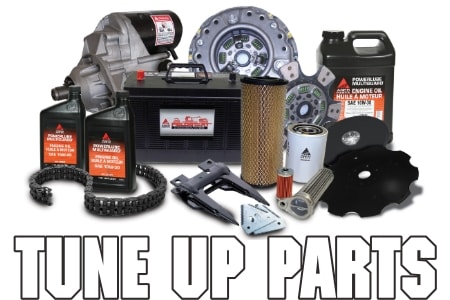 Of course, it’s always a good idea to shop around a bit before you settle on a specific provider, and one of the best ways to find different providers to compare is by inputting “car tune up near me” and/or “how much should I pay for a car tune up?” on Google and see which providers come up. Also, look out for tune up coupons to help minimize the cost.
Of course, it’s always a good idea to shop around a bit before you settle on a specific provider, and one of the best ways to find different providers to compare is by inputting “car tune up near me” and/or “how much should I pay for a car tune up?” on Google and see which providers come up. Also, look out for tune up coupons to help minimize the cost.
Thing is, there are a lot of scammers out there that will mislead you into thinking that you need more repairs than is really necessary just so they can make an extra buck. If you’re not well-informed on the subject then you can easily fall prey to such scams, which is why it’s important to familiarize yourself with your car’s manual and understand your vehicle’s needs better.
What’s a Tune Up?
Well, preventative vehicle maintenance has always been and will always be an essential part of car ownership, but the nature of tune-ups has changed a lot due to changes in-car technology. Still, this term is widely used to designate a particular process whose main aim is to promote better engine performance. There’s currently no general consensus on what should be included in a tune-up although some tasks like making adjustments that help to keep the engine functioning optimally or replacing spark-plugs come pretty standard with every tune-up procedure.
While the latest model vehicles don’t really need that much work under the hood anymore, as most of the car’s functions are controlled by the engine computer, there are still a few tasks that you can perform by going under the hood, such as checking that emission function, idle speed and base timing are all working as they should and according to factory specs.
While there isn’t much to ‘tune’ anymore, most motorists still consider tune-ups necessary, either because their car is not as drivable as it once was, perhaps due to experiencing problems with the starter and a lack of proper fuel mileage. Or maybe their vehicle just keeps stalling or hesitating or is just not running the way it used to when it was new. Another big concern for car owners is having their vehicle fail an emissions test, which would require an engine performance test or some new spark plugs inserted.
While seemingly simple, installing new spark plugs can seriously improve fuel economy and your engine’s ability to start. In fact, some of the most basic maintenance tasks can have far-reaching effects on your car, like restoring its power and pep, lowering emissions and generally improving engine performance. However, if the problem cannot be fixed with a regular spark plug replacement, then a ‘tune-up’ would be useless in such circumstances.
Signs That Show You Need a Tune Up
Figuring out when to get a tune-up for your car can be quite challenging because the signs are not always so obvious. While some signs are easy to notice, like decreasing fuel efficiency, difficulty in making turns or a misfiring engine, others are more subtle and difficult to spot.
Here are just a few of the signs that you should look out for as an indication that your car requires a tune-up:
- Engine lights come on. Seeing your engine lights come up can be quite annoying, and most people tend to ignore them as a result. However, it’s important to heed their warning because seeing them come on is usually an indication that there’s an urgent maintenance problem that needs immediate attention.
- A car that refuses to move even though you’ve pressed your foot on the accelerator pedal is one of the most frustrating issues for drivers, but it only happens when there’s an underlying problem that needs to be fixed. So you should definitely have it checked out.
- Fuel economy. By now, you’re probably familiar with your car’s fuel needs, and that makes it easy to notice when they change. A car that requires filling up more often than usual can significantly reduce overall fuel efficiency and definitely warrants a visit to the service center.
- Brake problems. Experiencing brake issues can seriously compromise your safety on the road and should be investigated immediately. Brake problems manifest in a lot of different ways, such as feeling spongy or too soft or making scraping and whining sounds, which could signal failure of the entire brake system.
- Rough shifting. Shifting your gears should never be an issue when you have a well-functioning automatic transmission system, and even the slightest problem with the transmission can affect your ability to shift gears smoothly.
- Vibrations or shaking. If the steering wheel of your car wobbles or your seat shakes every time you apply the brakes or start and steer the vehicle, then you might be dealing with several problems that are messing with the fundamental functions of your vehicle. Such problems require the prompt attention of qualified professionals, so don’t hesitate to take your car to a local car repair shop when you experience these issues.
Basically, if you notice anything unusual about your vehicle’s performance then you need to have it checked out by a professional who can identify the problem as soon as possible. It’s always best to get a tune-up before things get worse, as waiting too long might lead to other more serious issues.
How to Tune a Car
The easiest way to save money on a car tune-up is to do it yourself. The owner’s manual of your car contains all the information you need on the particular maintenance tasks that you need to complete, and you can easily purchase the components from your nearest Advanced Auto Parts or a similar store as well.
If you choose this route, then you’ll find that it’s much cheaper to purchase the parts than it’s to pay your local repair shop for the job because their prices will include certain markups and labor costs.
Below, we provide you with a convenient definition of each task so that you understand what it takes to complete each of them, and you can also look online for helpful guides that feature step-by-step instructions. Otherwise, most tune-up tasks like changing filters, spark plugs and fluids are actually quite easy to do and you can complete them in a jiffy.
What Does a Tune-Up Consist Of?
There are several aspects of a tune-up that need to be completed each time that will help you protect your investment, which is your car. Professional service providers usually have a team of technicians that are able to recognize the causes behind certain performance issues in your car by reading the information that’s on your car’s computer. Your mechanic will most likely also check the manufacturer’s recommended service schedule to ensure that your car’s performing like it should.
It’s important to consult with your car’s computer and manufacturer’s recommendations first, as that’ll give you an idea of what you should look out for during the tune up process. It’s also very important that you check each and every one of the tasks mentioned below at every tune-up, and keep in mind that the total cost differs for everyone because not all vehicles require the same tasks all the time.
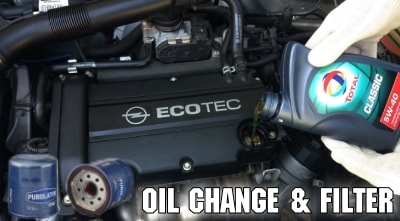 An oil change is one of the most important maintenance tasks there is, because not only does motor oil keep your engine well lubricated, but it also coats the pistons and other components so that they work more efficiently. The oil filter needs to be checked for any dirt and debris that may have accumulated over time, as this may cause restrictions in the flow of oil while causing untimely wear on the affected components.
An oil change is one of the most important maintenance tasks there is, because not only does motor oil keep your engine well lubricated, but it also coats the pistons and other components so that they work more efficiently. The oil filter needs to be checked for any dirt and debris that may have accumulated over time, as this may cause restrictions in the flow of oil while causing untimely wear on the affected components.
All you have to do is release the plug beneath your car, as well as the filter in order to drain all the remaining oil from your engine. The typical cost of replacing the oil is usually about $30 to $50 depending on the amount and type of oil required by your car, and the easiest way to find out what oil is best for your car is to ask a professional. Also, don’t be too stingy to pay for high mileage and synthetic oils if that’s what’s recommended because it’ll be better for your car in the long run.
-
Replacing Air Filters
An engine cannot run without air because air when combined with gas, activates the spark plug which is what ignites internal combustion. Unfortunately, these days, air filters have to work overtime purifying the air from outside which is usually filled with pollen, bird feathers and other particles that can damage your car’s engine. That’s why you need to make sure that the engine is always taking in clean air by replacing the air filter on a regular basis.
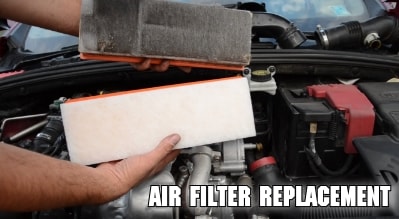 Now, there are many different types of car air filters out there, most of which have a rectangular shape, although older vehicles tend to have donut-shaped air filters. These filters are made from a porous material that looks and feels like paper and is folded up in pleats. They are a simple and efficient item that’s used to filter out all the dirt and debris that would damage your car’s engine, while only letting in clean air.
Now, there are many different types of car air filters out there, most of which have a rectangular shape, although older vehicles tend to have donut-shaped air filters. These filters are made from a porous material that looks and feels like paper and is folded up in pleats. They are a simple and efficient item that’s used to filter out all the dirt and debris that would damage your car’s engine, while only letting in clean air.
Modern-day cars typically contain two air filters. One is located in the engine compartment and the other one near the cabin. Similar to other types of filters, their job is to prevent dirt and other particles from getting into your car’s engine.
The good news is that it’s really easy to replace these filers and they usually cost about $10. No special knowledge is needed to save for the information provided in the air filter reference book, which is almost always located close to the air filters. Just look through the reference book to find the particular filter required for your particular car make and model, purchase and install!
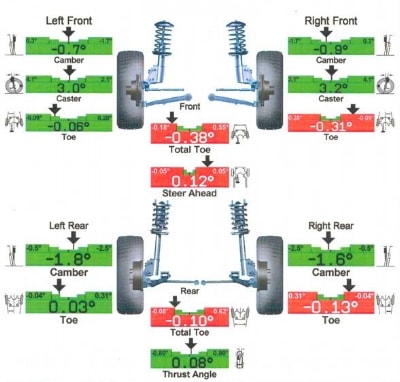 Your car’s suspension system, which is connected to the tires, can be easily knocked out of alignment due to contact with things like potholes and other problems that you may encounter on the road. Over time, this can lead to issues like your car swaying and swerving uncontrollably or problems with your steering wheel. This is a sign that your tires need realigning, a process that will save you tons of money in replacement costs in the long run.
Your car’s suspension system, which is connected to the tires, can be easily knocked out of alignment due to contact with things like potholes and other problems that you may encounter on the road. Over time, this can lead to issues like your car swaying and swerving uncontrollably or problems with your steering wheel. This is a sign that your tires need realigning, a process that will save you tons of money in replacement costs in the long run.
Wheel alignment is the job that will require the expertise of a professional technician, and they typically charge between $75 and $150. As with anything, it’s advisable to shop around to get a good deal before settling on a provider and make sure that the technician uses an electronic measurement system to make sure that the tires are readjusted properly and according to the factory specs.
The technician may also find additional issues after performing a suspension inspection, although this is not always the case. However, if your technician does make this recommendation, then you might want to get a second opinion before following their advice.
Spark plugs are responsible for sparking the air and fuel mixture and are usually located at the top of each cylinder and attached to a wire that transmits the electricity needed to ignite the spark. Spark plugs usually start to deteriorate once you’ve reached a certain mileage, and their lifespan is also dependent on the type of material they’re constructed from. The most obvious sign of deterioration is a car that’s not running as smoothly as it once did.
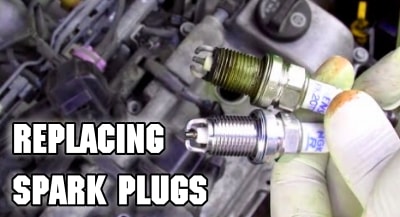
Most car engines carry four spark plugs while larger vehicles like trucks and SUVs have about eight spark plugs. Obviously, the number of spark plugs needed will affect the total cost of the service, and in most repair shops, it can range from $100 to $200. However, this is a task that you can perform on your own, granted you have the specialized ratchet needed to reach the spark plugs, as getting to them with your hands could be very hard. To find out the type and amount of plugs required for your car, consult with someone at your local auto parts store, where you can also purchase the spark plugs for about $50.
-
Fuel Filter Replacement
As with any liquid, there tends to be a fair amount of debris that floats above the liquid gas in your gas tank, causing the gas tank to rust, while dumping harmful moisture and depositions on your engine, which then creates performance and combustion problems. That’s why fuel filters are so important, and you’ll usually find them in the line that sits between your engine and the gas tank, and will either be separate from or attached to the fuel pump.
The typical cost of buying a fuel filter is about $20-$30, whereas replacing it at an auto shop can set you back about $100.
-
PCV Valve Replacement
PCV stands for a positive crankcase ventilation valve, and it’s a component responsible for releasing pressure from gases that have accumulated in the crankcase. It’s important to periodically vent the gas to avoid problems like blow-by, and it’s a low maintenance component that only needs to be replaced once a year on average.
PCV valve replacement cost: The part itself costs $10 and you can easily replace it yourself, whereas a professional will probably charge you $50 for the same procedure.
Transmission fluid is easy to notice because, unlike motor oil, it’s usually green or red in color and has low viscosity. Its job is to ensure proper transmission function, and it also helps to lubricate the gears to enable proper heat distribution for a smooth automatic transmission.
Beware that most mechanics over-recommend this service, and oftentimes unnecessarily, so you should definitely consult with your car service manual and check the component’s actual condition before following that suggestion. If it turns out that your vehicle does indeed require a transmission fluid flush, then we’d advise that you let a professional do the job for the best results, and you can expect to pay between $150 and $300.
Brake rotors, also known as brake discs, are the first thing that your brakes touch when you engage the brake pedal. Brake pads, on the other hand, are separate but similar and are located above the rotor so that the brakes are ready when you engage.
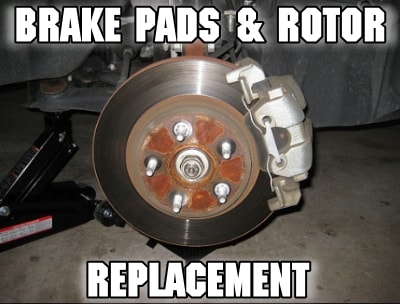 You’ll know that the exterior part of the rotor is worn out when it gets super thin and is way below minimum thickness. You can extend the rotor’s lifespan by replacing your brake pads regularly, alternating between the rear and front axle sets in order to avoid uneven wear.
You’ll know that the exterior part of the rotor is worn out when it gets super thin and is way below minimum thickness. You can extend the rotor’s lifespan by replacing your brake pads regularly, alternating between the rear and front axle sets in order to avoid uneven wear.
Replacing brake pads typically costs about $150 per axle, while new rotors will set you back an extra $100 per axle. So, you can expect to pay about $500 for both services. If you do have experience in replacing brake pads and rotors, then, by all means, knock yourself out, but if you’re not sure how it’s done then have a professional technician to do it because it’s not a job for inexperienced car owners.
-
Timing Belt Replacement
The timing belt is situated under the hood and is easy to spot as it’s the only rubber band on there. This belt serves the important function of keeping your cam and crankshafts connected so that your engine can run smoothly. While you’re at it, replace the tensioners and pulleys as well, because they’re connected to the timing belt and having any of these parts fail can cause serious damage on the pistons and valves, requiring you to fork out even more for this costly repair. Ideally, the timing belt should be replaced as soon as it starts to make funny squeaking noises.
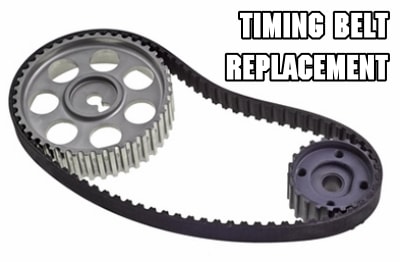 The components required in a timing belt service can set you back about $150, with labor making up most of the job. If the technician has to remove several components in order to reach the timing belt, then labor costs can hike up to $800.
The components required in a timing belt service can set you back about $150, with labor making up most of the job. If the technician has to remove several components in order to reach the timing belt, then labor costs can hike up to $800.
Usually, a timing belt replacement for a car costs $500 and for larger vehicles like an SUV or truck, it can go up to $750. This is undoubtedly the costliest part of any tune-up, but it’s also an essential part of your car’s maintenance. So, don’t try to skip it thinking that you’ll save money, as doing so might cost you way more in the future.
Where Can You Tune Up Your Car?
- You can do it on your own and save money.
- Get your local dealership or mechanic to do it for you.
- Goodyear Auto Centers
- Valvoline
- Meineke
- Walmart Auto Services
- Midas
- Firestone Complete Auto Care
- Sears Auto Centers
- Pep Boys
- Jiffy Lube
Tune-Up Service Tag Cloud
tune up for honda civic , transmission tune up vs flush , will tune up fix check engine light , when to tune up motorcycle , tune up mechanic , quality tune up san leandro , tune up on car near me , where to get a tune up for your car , tune up transmission , tune up jeep grand cherokee , tune up volvo s60 , tune up toyota , tune up hyundai elantra , tune up jeep cherokee , tune up lexington ky , tune up for truck , quality tune up coupons , tune up greenville sc , when to tune up car , tune up for motorcycle , tune up las vegas nv , tune up estimate near me , will a tune up increase hp , tune up jiffy lube cost , tune up pep boys , tune up vehicle cost , tune up lawn mower , will a tune up help pass smog , tune up huntsville , can a tune up improve gas mileage , what tune-up includes , tune up hvac , tune up nissan altima , tune up el paso , tune up tires plus , quality tune up roseville , tune up austin tx , tune up mobile mechanic , will tune up help gas mileage , tune up goodyear , tune up average cost , tune up at jiffy lube , tune up at midas , how much are tune up for car , tune up lawn tractor , tune up and oil change , tune up honda jazz , tune up locations near me , can a tune up fix catalytic converter , tune up auto , tune up jacksonville fl , where to get tune up near me , tune up jersey city , tune up honda crv , where to get tune up , tune up firestone , what will a tune up do for my car , tune up hyundai accent , can tune up increase horsepower , tune up near me prices , tune up nissan , tune up rayford , can you tune up diesel engine , quality tune up san jose , tune up bmw , will tune up fix cylinder misfire , tune up nissan murano , tune up for motorcycle , tune up mobile mechanic , what's a tune up cost , where to tune up car , how much are tune up kit , tune up near me cost , tune up rock hill sc , tune up with meaning , will tune up , tune up truck , will a tune up help acceleration , tune up nissan rogue , tune up at walmart
In this guide you will find:
